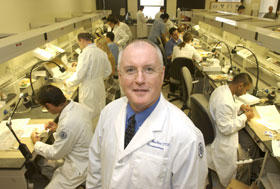For more archives, go to the Advance Archive/Search Page.
Dental Administrator An Experienced Practitioner, Educator
When Monty MacNeil was growing up on his family's small farm in Nova Scotia, getting a college education was a lofty ambition. He never imagined that one day he would be a top administrator at a renowned school of dental medicine.
 |
Monty MacNeil, associate dean for dental academic affairs, at a dental teaching lab at the Health Center.
|
"It was a pretty basic, no-frills upbringing," says MacNeil, associate dean for dental academic affairs and professor in the Department of Periodontology at the Health Center. "We were the first generation to even think about college."
After obtaining a dental degree in Halifax, and practicing general dentistry for six years, MacNeil first came to UConn in 1986 to obtain an advanced degree. Twelve years later, he returned to UConn as a faculty member and administrator.
MacNeil entered St. Francis Xavier University in Antigonish, Nova Scotia, on an academic scholarship. Coaxed into taking the Dental Aptitude Test by a friend, he gained early acceptance to Dalhousie University Dental School in Halifax at the end of his junior year. He left St. Francis Xavier without his bachelor's degree to enroll in dental school.
"It's a decision I have never regretted," he says. "It was an enriching environment - one that encouraged the pursuit of the profession in any direction. Many graduates went into academics, but whatever direction you went, you were well prepared."
Unlike the United States, where students pursue advanced training right after graduation, Canada's dental graduates were encouraged to practice general dentistry before selecting a specialty, something MacNeil thinks more new graduates should consider.
"The six years I practiced general dentistry in Halifax continue to be beneficial," he says. "I think more broadly about the profession and the educational program behind a dental medicine degree." During that time, MacNeil also served on the dental faculty at Dalhousie as an instructor and lecturer.
In 1986, MacNeil's clinical interests and his growing inclination toward academics led him to pursue an advanced degree in periodontics at the UConn School of Dental Medicine. "I was very impressed by the school's balance of clinical training and research, and its record of producing quality faculty who were quickly becoming leaders in U.S. dental education," he says. "I was exposed to a group of very bright talented students who were pursuing Ph.D.'s, master's degrees, and certificates - and they were questioning existing standards and ways to improve dental education.
"The combination of researchers and teachers, filled with ideas and energy, was exciting - each brought something different to the mix," he adds. "I rapidly became hooked on the research and the academic aspect of periodontics."
After earning a certificate in periodontics and a master's degree in dental science at UConn, he was appointed assistant professor in the department of periodontics at Indiana University School of Dentistry, and in 1991 joined a new research team at the University of Michigan in Ann Arbor.
He returned to the UConn School of Dental Medicine in 1998, as associate professor in the department of periodontology, director of the Dental Clinical Research Center, and associate dean for dental academic affairs. He immediately began working with faculty on a major curriculum revision and two months later, he was asked to lead the school in its upcoming accreditation self-study. "There is no better way to fast-track your understanding of a school than to lead an accreditation self-study," he says. "I learned a lot."
MacNeil says UConn is exceptional among U.S. dental schools. "When our first-year students talk to dental students at other schools, our students quickly understand that they are experiencing something different here," he says. "Our emphasis on medical science education, and the way our program is tailored makes for excellent all-round graduates and sets us apart from other dental schools. Our students probably work the hardest of any in the country, and they prove that each year, as evidenced by the school's consistent top-five ranking. Our students are highly recruited, and we want to ensure that those opportunities remain and grow."
MacNeil says there are several challenges ahead in guiding the school's curriculum. Dental schools, especially those that are state-supported, are being asked to become more actively involved in the community. "I can't think of a more worthy objective for our school," he says.
The dental school recently secured a five-year grant from the Robert Wood Johnson Foundation to change the curriculum. "This will allow us to broaden the educational experience of our students and residents, and help our neediest citizens," he says.
Another challenge facing the school, says MacNeil, is recruiting students and graduates into careers in education. Private practice is a solid and rewarding career choice, he says, and because of that it's becoming more difficult to entice the best and brightest into academics.
"I think it's very important that students see teaching as the rewarding, fulfilling experience it is," he says. "We may have lost this a bit in dental education, and I think it's important to get it back."
MacNeil was recently appointed chair of the Joint Commission on National Examinations, an honor of which he is very proud. In addition to the dental school's consistent top-five national ranking, it ranked number one academically in 2001 and 2003, based on students' test scores on part II of the National Board dental examinations.
"It's fantastic when it all comes together," says MacNeil. "The rankings are a fleeting accolade to something our students and faculty already know - we're a top notch dental school."

